While people were still digesting the news that the controversial ECRL (East Coast Rail Link) is about to start as early as next month, after the new Malaysian government victoriously announced the initial RM65.5 billion project will be one-third cheaper, Prime Minister Mahathir Mohamad dropped a bigger bombshell on Friday (April 19) – the revival of RM140 billion “Bandar Malaysia“.
Fingerprints of former Prime Minister Najib Razak were all over ECRL and Bandar Malaysia multi-billion dollar projects. Both mega projects were initially hatched by him to bail out his scandalous 1MDB pet project. Mr Najib’s frequent travelling to Beijing prior to losing power last year, selling everything under the sun, was seen as selling the country’s sovereignty to the Chinese.
Mr. Najib, slapped with 42 charges of criminal breach of trust (CBT), money laundering and abuse of power after his regime collapsed last May, has since recruited a battalion of cyber troopers running his Facebook page. He accuses his mentor-turned-nemesis, PM Mahathir, of making a U-turn in reviving the ECRL project, after promising to cancel it during the election campaign.
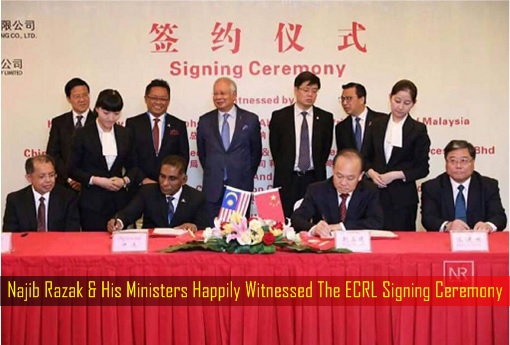
The resumption of ECRL, after the initial dramatic 9 months suspension, was realised after extensive re-negotiation process with Beijing. As much as Najib would like to cleanse his dirty hands off the rail link project, he will go down in history as the man who signed a deal with the hidden RM21.78 billion termination penalties, on top of a bloated price tag of RM65.5 billion.
The new government had no choice but to continue the ECRL project inherited from the corrupted Najib government – with a better deal, lower risk and cheaper price tag. The saving of RM21.5 billion or 32.8% was only possible due to the special relationship between Malaysia and China, a privilege that other countries participating in “Belt and Road Initiative” do not enjoy.
But what about the “Bandar Malaysia” deal? Why did the Mahathir administration decide to revive this project? Unlike the ECRL, former leader Najib Razak cannot accuse Mahathir of flip-flopping in resuscitating Bandar Malaysia. Bandar Malaysia, announced in 2011 by Najib, was abruptly cancelled by him in 2017, and not by Mahathir.
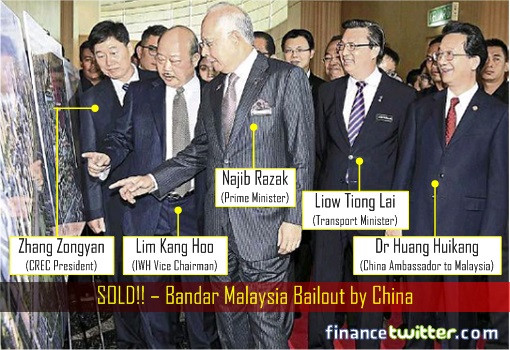
Interestingly, the project will be developed with its original partners, Iskandar Waterfront Holdings Sdn Bhd (IWH) and China Railway Engineering Corp (CREC), which own a 60% stake in the joint venture with the rest owned by the government. The consortium previously secured the deal in December 2016 via the 60% stake worth RM7.41 billion.
Flashback – the deal fell through due to a so-called breach in contract terms. Najib accused the Chinese investors of “failing to meet the payment obligations” under the share sale agreement. Amusingly, despite claiming that IWC-CREC had failed to honour the obligations, which the consortium denied, Najib was kind enough to return RM785.9 million, being the deposit for the project.
If indeed the IWC-CREC had breached the terms of contract, Najib regime could forfeit the deposit. It was one of the most unethical business practises committed by the despicable Malaysian leader. Najib got greedy and wanted a better deal even after his government had signed the deal. He wanted to start a new partnership with Wang Jianlin of Dalian Wanda Group.
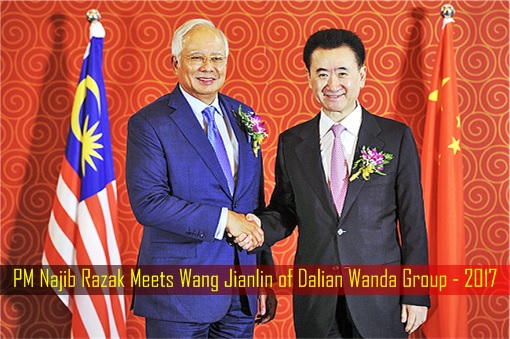
As China’s largest real estate developer and the kingdom’s richest man, billionaire Wang Jianlin probably could bid a higher price for Bandar Malaysia, or so Najib thought. The greedy Najib flew to China in May 2017, seeking Beijing’s blessing. Wanda reportedly had proposed to use half the development of Bandar Malaysia for tourism and entertainment-related ventures valued at roughly US$8 billion.
By July 2017, Najib’s grand plan was crushed spectacularly. Apparently Wang Jianlin’s Wanda Group, together with other Chinese big boys such as Fosun, Anbang and HNA, were being placed under scrutiny, amid crackdown on money laundering. And Mr. Najib didn’t get the memo. Beijing was also not impressed that Malaysia had terminated IWC-CREC deal unethically.
The consortium of IWH-CREC was supposed to bail out 1MDB, whose debts began at RM5 billion in 2009 but quickly jumped to RM42 billion at the end-2014. By January 2016, 1MDB’s debts ballooned to RM50 billion. It was so massive that 1MDB was spending RM3.3 billion just to repay interest on its debts between April 1, 2014 and March 31, 2015 alone.
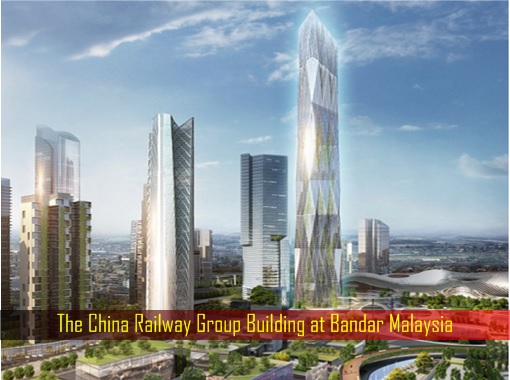
Mr. Najib lost the bird in his hand as he thought he could get two in the bush. His corrupt and greedy government then tried inviting Fortune 500 companies, even set the conditions that they must have a combined revenue of at least RM50 billion in the past three years to be qualified. The regime thought foreigners would rush for the role of master developer in the Bandar Malaysia project.
Like his serial liar boss, former Treasury secretary general Mohd Irwan Serigar Abdullah lied when he said six companies have shown interest. When the new Pakatan Harapan government took over, it was discovered that no firm had come forward to take up the challenge. Nobody was interested even though an open tender has been offered for some time for the proposed 197ha project.
Now that the government has decided to reinstate the Bandar Malaysia Project following a Cabinet meeting on April 17, it raises eyebrows whether the successful re-negotiation of ECRL project has anything to do with IWH-CREC – the original master developer – getting back the project they had won but suddenly terminated by the old government.
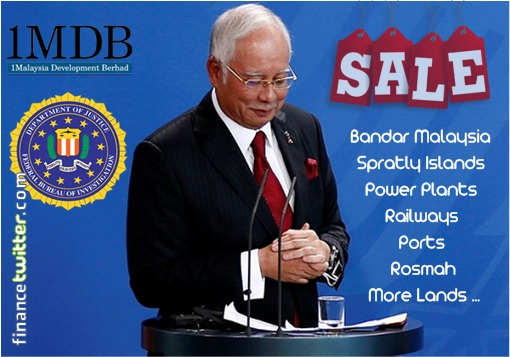
When asked why the government did not offer the project through open tenders – a policy heavily trumpeted by Pakatan Harapan, PM Mahathir said his government felt that the original contractor had been unfairly terminated, proving that Najib regime had indeed committed an unethical business practise which led to Beijing pulling the plug on the Bandar Malaysia project.
Bandar Malaysia is a 197ha project at the former Sungai Besi military airport in Kuala Lumpur. The relocation of the oldest Royal Malaysian Air Force (RMAF) base to the Sendayan RMAF base in Negri Sembilan was reportedly costing taxpayers a whopping RM1.0865 billion. Amazingly, 1MDB was given the money by the Najib government for the relocation work.
What 1MDB did was sub-contract the job to another contractor for RM800 million and pocketed the remaining RM286.5 million. The best part was despite being called an airbase to serve the newly relocated RMAF, the new Sendayan Airbase (formerly oil palm plantation site), inaugurated by Najib Razak in March 2018, actually “does not have a runway.”
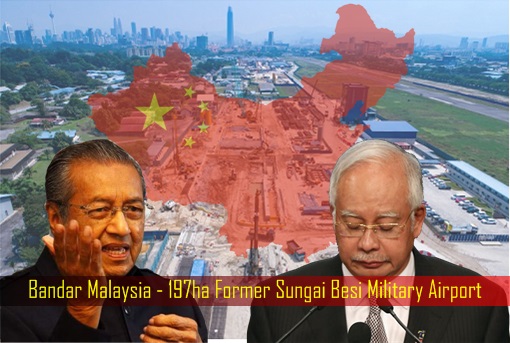
Like it or not, the new government has to decide what to do with Bandar Malaysia. Leaving earthworks and other utility infrastructure work without any progress was a bad option. More importantly, the country’s construction industry has been slowing down to a dangerous level, in line with the slowdown in the global construction sector and the economy.
Considering that the construction industry contributed 5.9% to the GDP in 2017, in comparison to the total industry growth for the year of 6.7%, the sector could either break or make the newly crowned Pakatan Harapan government. With the attention being focused on ECRL and Bandar Malaysia, it seems the Mahathir administration is finally on the right track, fixing the economy instead of politicking.
Still, the government is broke, thanks to the RM1 trillion in foreign debts accumulated by the previous Najib government. Mahathir and his ministers can either continue crying, whining and bitching about the crook, or stimulate the economy by boosting the construction industry. To drive the industry, the country has to rely on the kingdom with the largest foreign currency reserves in the world – China.
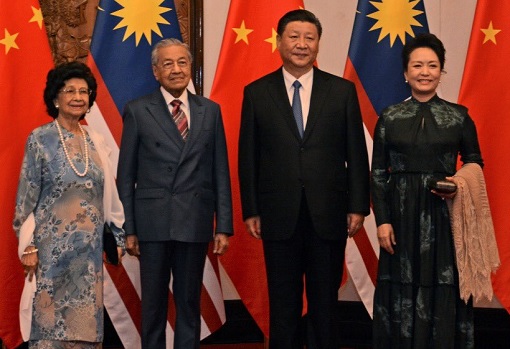
According to the PMO (Prime Minister Office), the Bandar Malaysia project, like the East Coast Rail Link, should be viewed within the larger context of fostering and cementing long-term bilateral relations between Malaysia and China while ensuring that such projects add maximum economic value to Malaysia. That’s an admission that Malaysia needs China more than China needs Malaysia.
The revival of Bandar Malaysia will see an advance payment of RM500 million, in addition to the original deposit sum of RM741 million from the IWH-CREC consortium. The PMO also said Bandar Malaysia will serve as a global hub to further attract high impact global finance, technology and entrepreneurial firms. Alibaba and Huawei have reportedly expressed interest to establish their ICT centres here.
The Mahathir government hopes the revived project could draw major international financial institutions, multi-national corporations and Fortune 500 Companies to locate their regional headquarters in Bandar Malaysia. That would create substantial jobs. Economic Affairs Minister Azmin Ali said the project will be driven by the private sector and not through government funds.
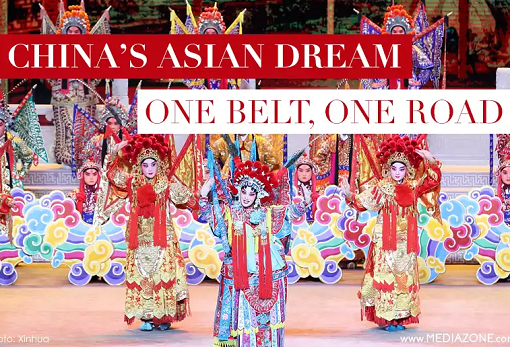
If that is true, there’s little doubt that China will be the ultimate investor with deep pocket willing to splash money in Bandar Malaysia, thus enhancing the Chinese influence in the country. The two projects – ECRL and Bandar Malaysia – will contribute significantly to President Xi Jinping’s Belt and Road Initiative (BRI). And Malaysia hopes to exploit its multiplier effects along the value chain.
A day before Mahathir announced the reinstatement of Bandar Malaysia, he was entertained with 5G technology – from making a 5G video phone call using a Huawei smartphone to taking a ride in a blue autonomous vehicle, driven using the 5g technology. The excited prime minister was confident that Malaysia can leverage on 5G within the next 3 years to push the national economy further.
Najib can brainwash his supporters on his Facebook page that Mahathir is equally guilty of selling out the country to the Chinese. However, the fact remains that it was Najib who opened the floodgate to China. Mahathir merely fixes the debt problems as much as he can. Comically, UMNO-Malay can no longer tell the ethnic Chinese to “balik tongsan (go back to China)”. Tongsan is already here on invitation by both Najib and Mahathir.
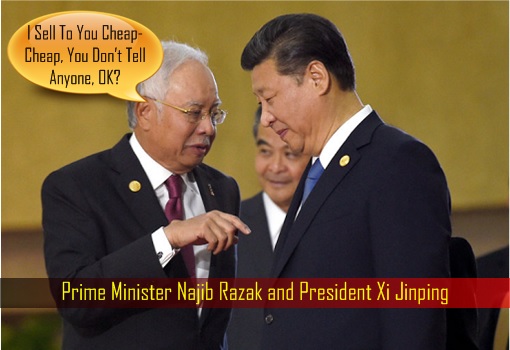
Other Articles That May Interest You …
- Don’t Blame China Or Mahathir – Moron Najib Signed The ECRL Deal Hidden With RM22 Billion Penalty
- How Najib Almost Got Away With RM21.5 Billion, Until Mahathir Govt Negotiated A New Brilliant ECRL Deal With China
- Superpower China Will Not Allow ECRL To Be Scrapped, And There’s Nothing Malaysia Can Do
- Without Billionaire Robert Kuok, Mahathir May Not Get China’s Approval To Cancel Najib’s Wasteful Projects
- Sending A Message To China – Here’s Why Mahathir’s Visit To Japan Is A Brilliant Strategy
- The Dragon Has Landed – China Kick-Off Defence Triangle Via ECRL Malaysia
- A Greedy Najib – From China To U.S. Fortune 500, Bailing Toxic Bandar Malaysia
- No Deal For Bad Deal – Here’s Why China Pulls Plug On Bandar Malaysia
- Bandar Malaysia Has Become “Bandar China” – The U.S. & Malays Conned By Najib

|
|
April 21st, 2019 by financetwitter
|


|

|

|

|

|

|




























With so much of his hands being dirtied and selling the country sovereignty and assets off by outright devious manipulations.Why is PH so goody goody with this bloody crook of lanun. He is being treated like VVIP in the docks allowing his idiotic behaviour of reading a book , not wearing orange garb, drinking coffee and going to the restroom at his convenience. All these are a plain show of contempt to the court room and PH government. PH Stop the hypocritic act of being political correct and in the guise of strict observation in the rules of law when common rakyat are sadly dispensed with double standards basis. Najib should have been convicted early and the massive treacheries to the country, fully deservingly a trip down the dark alley way to the gallows. He has been plundering the country since his early age from a young Minister till to PM. He has no love for the rakyat or the country and if he has to be hung there is no love lost on him by the rakayat. why are we waiting.??????????????????????